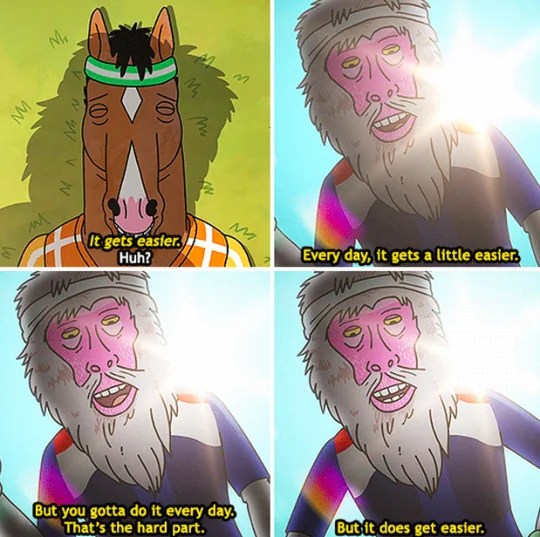This is article number 100.
I started this blog around 2019—built it up in March or April, but didn’t start posting until May. I posted my welcome article on May 6th, followed the next day by the first post in my S.O.L.I.D series (which I only now realize I posted as D.S.O.L.I—completely out of order).
I think I read somewhere that having a blog could be beneficial for your career, or maybe I read somewhere else that writing is a good way of solidifying knowledge you had recently acquired. It does not really matter at this point, I quite like writing, and after a few years it has become a one of those comfortable things that I do just for myself.
It wasn’t always this pleasant. Getting started was genuinely challenging, and I think for me the most difficult things were:
I didn’t think I was any good at writing. I still don’t feel completely satisfied with my skills—that will probably take a few more years—but at least I know I can finish an article (or even a series) without completely hating everything I’ve written.
English isn’t my mother tongue. If writing in my native language felt uncomfortable, adding this layer of complexity certainly didn’t help. But it had the happy side effect of improving my language skills, turning an initial obstacle into a double benefit.
I didn’t feel I had anything worthwhile to share. This is probably the number one reason people don’t start blogs, write books, or launch projects. The belief that you have nothing valuable to contribute is both a damaging self-limiting thought pattern and complete bullshit. You do have something worthwhile to share—I can guarantee it. The best thing you can do for yourself and your creative capacity is to stop listening to this dumb-ass inner voice.
I’m not saying it will be easy or comfortable, but it will be worth it. For me, this fear was amplified by a combination of factors: there are many excellent technical books and articles out there, I love reading them, and you know, comparison truly is the thief of joy. Knowing this is not enough to resist the feelings, of course.
Being critical of your work is healthy and essential for growth—as a person, professional, and creative. Yes, creative. Many people, especially in tech, don’t see themselves as creative types. They imagine techies and creatives occupy opposite ends of some spectrum, but this is nonsense.
We all have the capacity to create and share something worthwhile. The problem stems from inflated expectations about the quality we must produce at all times:
If every program isn’t the greatest thing ever, we’ve failed. If every project isn’t the most successful, we’ve failed. If every article isn’t the single best piece of writing ever, we’ve failed.
So we never write the program, start the project, or publish the article.
This isn’t about accepting mediocrity—it’s about acknowledging that the road to excellence involves creating countless less-than-excellent artifacts. Maintaining perfection in everything is impossible (unless you do very little), and expecting perfection from the beginning is even more unrealistic.
Mastery requires massive amounts of effort and practice. Most of what you create probably won’t be exceptional, at least not most of the time. But that’s perfectly fine. Keep writing, keep programming, keep practicing guitar. Little by little, these things become easier.
There’s this show about deeply flawed anthropomorphic characters called BoJack Horseman—it’s brilliant. In season two, the titular character attempts to improve his life by starting to jog.
He doesn’t make it very far.
While still on the ground gasping for air, he’s visited by an anthropomorphic Japanese Macaque (the show calls him Jogging Baboon—small nitpick) who offers this advice:

That’s it. Everything becomes easier the more you do it, but you have to actually go and do it.
For me, the motivating idea has always been that no matter how small it seems, the knowledge I share might help someone. Without this love for sharing what I know, maintaining motivation would have been much harder (says the guy who took a three-and-a-half-year hiatus). I suspect the same applies to you—there’s a lot you have to share, despite feeling self-conscious about it.
This journey has made me happy and taught me much about myself and my industry. I like to believe it’s made me braver than I give myself credit for and helped me pursue projects I might otherwise have abandoned.
G.K. Chesterton said:
“Anything worth doing is worth doing badly”
I understand this better now. Society places enormous pressure on performance, making you believe everything must be compared against peak excellence at all times. This creates no space for growth, no room to find your voice.
Growth and learning happen when you maintain a playful attitude and curious mindset. When you give yourself permission to experiment and fail, to discover what works for you. When you can examine your work critically without feeling like a failure whenever you find room for improvement. When creativity and stepping outside your comfort zone are encouraged and celebrated. When you’re allowed to search for your own voice, style, and path.
In celebration of these ideas, this post goes out unpolished. I’ll keep writing, and I hope that in a few years, I’ll be a bit better at it. Doesn’t matter much when you’re having this much fun, right?
Thanks for reading.
